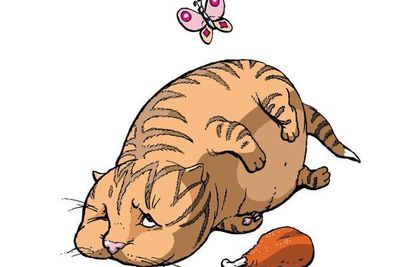Like so many Thanksgiving-themed posts, this one will not be about gratitude. Sure, there are many ways we can—and should—count our blessings on Thanksgiving. But I personally think we should get in the habit of counting those every single day.
A good way to remember to do that would be to incorporate a gratitude journal into your life. Before you go to sleep each night, jot down one or two things you are grateful for. It's a wonderful way to relax, reflect and start the next day off right. You'll be amazed at how much better you'll sleep thinking good thoughts.
Speaking of sleep …food comas. Are you familiar with them? Most commonly, they occur around the Thanksgiving feast. And they make you want to excuse yourself from the party, lie down and sleep.
The turkey is not the only one who is stuffed—you are, too.
Are Food Comas Real or Are They Imagined?
Turns out they are real. Well, you won't fall into an actual coma—but you might very well feel like you're in one.
"A food coma—aka, postprandial somnolence—is the physiological response to people stuffing themselves with food," says registered dietitian and exercise physiologist Samantha Heller, who is also the author of Get Smart and hosts the popular Health and Nutrition Show on Sirius XM Doctor Radio.
"It is completely avoidable and unnecessary," she says. "For some people, the 'holidays' are license to overeat to the point of actually feeling ill. They skip meals in anticipation of a titanic meal later in the day. They skip exercise, portion control and imbibe indiscriminately."
(Yikes! I think someone is trying to send us a message.)
Don't Blame the Turkey: Myth Busted!
While it's true that turkey contains L-tryptophan, an amino acid that directly impacts serotonin levels (which induces sleepiness and relaxation), so do lots of other foods, like chicken, meat, cheese, yogurt, fish and eggs.
"Carbohydrates have to be present in order for the serotonin levels to be impacted," explains Joy Dubost, PhD, a registered dietitian and a spokesperson for the Academy of Nutrition and Dietetics. "Thanksgiving turkey plus stuffing might be the combination needed to do that."
It's more likely that plain old overeating and possibly alcohol consumption are what create the sleepiness associated with food comas, she says. Those factors, coupled with the tendency for people to be "winding down and relaxing, all leads to a sense of being tired."
Symptoms of a Food Coma
- Sleepiness
- Lethargy
- Laziness
- Extreme fullness
- Bloating
- Gas
- Mental fogginess
- Ceremonial unbuttoning of pants (unless you wear elastic-waist pants in anticipation)
- Regret
- Self-loathing
- Swearing off food
- Swearing you'll only drink liquids starting tomorrow
- Swearing
- (OK, maybe only the first seven of the above are serious, but I'm sure the others will resonate with many of you.)
What Causes a Food Coma?
Isabel Smith, a New York City-based registered dietitian, explains: "Holidays mean calorie and carbohydrate-dense (starchy) foods that make the food coma almost inevitable. Food comas can be caused by both eating too much and by eating too many carbohydrate-rich foods—including potatoes, rice dishes, pastas, breads and desserts."
Translation: What makes this a perfect storm is that these foods are usually eaten all at once and all within the same meal.
Eating too much, Smith says, causes the stomach to expand (hence the ceremonial unbuttoning-of-the-pants), "which can make you feel overly full, bloated and gassy."
And feeling like all you want to do is sleep? That, Smith claims, is caused by the energy it takes to digest all that food. Likewise, the tired, foggy feeling that goes along with it "is caused by elevated blood sugar and successive hormonal response (including insulin and amino acid processing) that results from eating."
Tips to Avoid a Food Coma
From Samantha Heller:
Don't go to holiday parties starving. Eating a small snack before you go will keep you from overeating.
Focus on the foods you love and are only available at holiday times.
Choose small portions and eat slowly; savor the flavor and texture of your favorite food.
From Isabel Smith:
Don't skimp on meals or snacks in anticipation of eating too much at special events.
Make sure you keep your eating consistent meals during the holidays. Eating one large or two very small meals can lead to overconsumption at big meals and cocktail parties.
At big meals, aim to fill most of your plate (40% to 50%) with vegetables. If you're afraid there won't be healthy options available, offer to bring a salad.
From Dawn Jackson Blatner, registered dietitian and certified specialist in sports dietetics:
Chew food 10 times per bite before swallowing. This will slow you down and help you naturally to eat less. Added bonus: you'll feel less bloated if you chew food well!
Limit variety on your plate to just your absolute favorites; a variety of flavors stimulates your appetite and causes you to eat/want more. Having just your favorites doesn't feel like deprivation and gets your taste buds satisfied faster.
After a meal, drink hot ginger or peppermint tea, which helps with digestion.
From Yours Truly (me!):
Resist the urge to dress in your fanciest elastic waist pants or skirt. Instead, wear a tight-fitting pair of jeans or skirt with a waistband.
Don't drink too much alcohol. Not only can it add to your coma-like trance, but it can loosen inhibitions and make you feel like it's OK to have that second helping of dessert.
Right after eating, get up and do the dishes, take out the trash or put the leftovers away. You'll be less likely to sit around and pick mindlessly at the mounds of food likely to be left on the table (doesn't everyone always cook too much?)
Happy Thanksgiving to all my readers. I'm truly grateful for your support and comments!


